2020 Real Estate Strategies Conference Recap
The 9th annual Marquette University Real Estate Strategies Conference was converted to a three-part series and held during September, October and November 2020. More than 700 people attended the series, which focused on three themes – CEO Insights with CBRE Global CEO Bob Sulentic, Diversity in Real Estate: Success Stories for Company Leaders, and the 2020 Retrospective Survey analysis looking at the top 10 trends of the last decade and the next.
A recap of each part of the series as well as videos, photos and highlights can be found below.
Part 1
CEO Insights, Bob Sulentic, Chief Executive Officer, CBRE
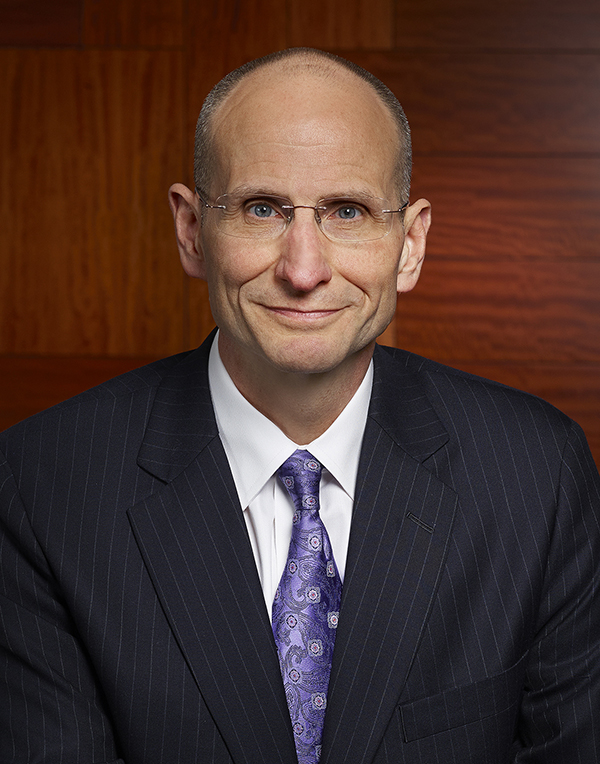 Part 1 of the 2020 Marquette University Real Estate Strategies Conference took place on Thursday, September 10, 2020 and featured a fireside chat with keynote speaker Bob Sulentic, President and CEO, CBRE (the largest real estate services company in the world, a Fortune 150 firm with more than 100,000 employees globally).
Part 1 of the 2020 Marquette University Real Estate Strategies Conference took place on Thursday, September 10, 2020 and featured a fireside chat with keynote speaker Bob Sulentic, President and CEO, CBRE (the largest real estate services company in the world, a Fortune 150 firm with more than 100,000 employees globally).
Due to the extemporaneous nature of the conversation, CBRE requested that the conversation not be recorded. Some highlights from the conversation included the following:
What was it like growing up in the Midwest and how has it shaped your career?
- Grew up in small town Iowa with no exposure to the coast and their cities
- Was a huge sports fan and active part of the community
- His town primarily focused on education and discipline
- Worked hard and did well in school, which helped shape him
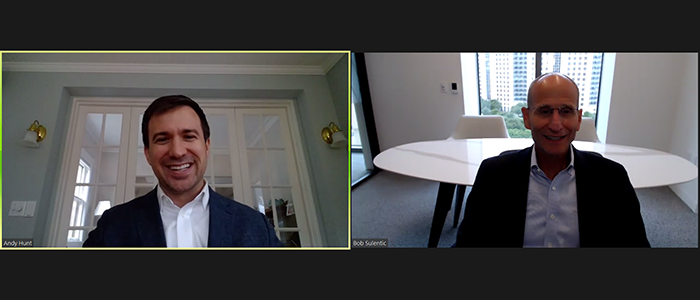
Read the rest of the Q&A with Bob Sulentic
What originally got you interested in real estate and keeps you excited about being in this industry today?
- Originally planned to attend veterinary school, but decided against it and needed a new idea for his future
- Received a degree in Computer Science, and worked as a programmer for 2 years
- After working as a programmer, he received his MBA from Harvard Business School
- Joined Trammell Crow Company as a Leasing Agent
What is your background with Trammell Crow? What was it like starting at such a prestigious firm during the 80’s?
- Joined Trammell Crow Company in 1984 in Houston, TX
- In Texas, massive energy boom followed by energy bust led to tough market
- Three years later, moved to New Jersey
- As the economy declined in 1990, Trammell Crow lost projects and team members left
- During the 1990 economic decline, Trammell Crow transitioned from development to services, including leasing, management, and outsourcing – a major transformation for the company
- Following the financial crisis, Danny Queenan (Marquette alum) was hired and was later put in charge of Trammel Crow after the merger with CBRE
What are the lessons learned from some of the struggles that you have had? What was Trammell Crow’s culture like that made it possible to be so open about the challenges?
- Many young, new leasing agents were sent to new markets with little experience
- Risky projects had 100% construction debt weren’t promising for long-term success
- Company hit tough times and took two decades to rebuild and achieve stability
Favorite or memorable deals?
- Favorite deals included ones in NE and NJ
- There wasn’t much opportunity for special development, but lots of HQ around
- First special development project was from 1995-1996 of an office space, and was exhilarating for Bob and the company
- Following the special development project, the company got back to good times after a period of instability
Trammell Crow & CBRE merging – What is the story of how that deal got done, and why was CBRE the right partner for this merger?
- Merger occurred in 1990 with the help of Bill Concannon
- Began outsourcing Real Estate services through Baxter Healthcare, which eventually grew into the industry’s top outsourcing business
- In 2005, the company wanted to go international with outsourcing, but Trammell Crow had no global presence
- CBRE needed outsourcing, so Concannon and Cal Fries negotiated a deal within a few weeks in 2006
- At the time of the deal, Trammell Crow had less than 1 billion in revenue – today it has had 14 billion.
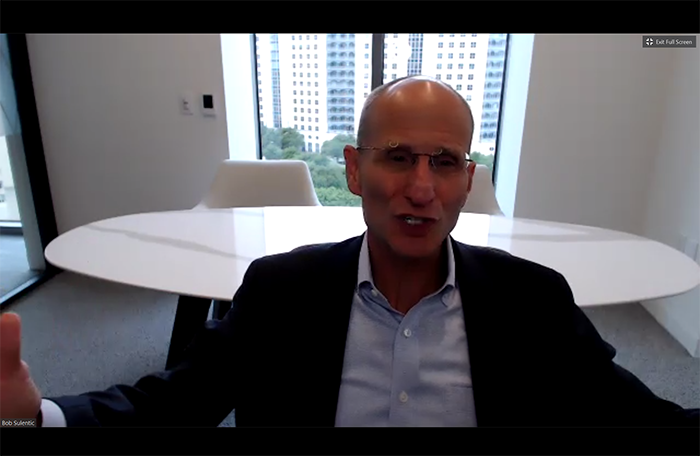
CBRE now – even though times are challenging, what do you see that’s giving you hope for life returning to normal?
- There is a lot of uncertainty right now, and employees can’t go out for inspections
- Although business is slowing, people will start coming back to offices
- Amount of non-disclosure agreements are growing, showing signs of interest
- For development, profits will likely double over this year and next year
- Business is growing for investment management, but new transactions are still on hold
- The company’s deals currently include industrial, multi-family, and some healthcare properties
- CBRE has a group of mature developers that are currently focused on core assets with lots of capital
Global workplace solutions had a great second quarter, and the company has local roots – CBRE acquired GWS from JCI, a Milwaukee global firm, several years ago. Talk more about that acquisition and their success?
- The GWS acquisition from JCI was a good transaction
- So much of the GWS work is all contractual, outsourcing facilities management for very large corporations
- GWS also makes them the biggest manager of data centers
- Part of diverse portfolio of business lines and revenue streams
- Yes, Midwest work ethic was part of it (laughter)
- Great team from JCI
What are some of the early signs about how occupiers are coming back, how are they going to use their space?
- Working from home has proven to be effective, with many benefits, but lacks the company culture that is needed to be successful
- Problem solving, collaboration among teammates, and onboarding new people are impossible if everyone stays home
- Going forward for CBRE, some people will work from home either full-time or part-time, but the company will be back in the office
- Due to more people working from home in the future, gave a prediction about the percent of office needed moving forward versus the percent of the office space that they use now, and will also be more spread out during the pandemic
- We can improve our lives by traveling and commuting less and having more opportunities to be at home, but being together is necessary sometimes
Highlights of sectors including office, industrial, retail – and do you think that multifamily will see expansion?
- Discussion around belief in multifamily, movement to the suburbs, traffic impacts, return of the urban core timeline, and a belief that the attraction to being in the city won’t go away
- Points about the long-term impacts of urban multifamily for institutional investors
Student Question, Zack Passios – what helps people stand out when they’re young in their careers?
- To stand out in their career, young people should be ethical, work hard, team well with others, and be resilient
- Must understand that there will be a decent amount of failures before you can see success
- Communication is key
- Don't make the mistake of just trying to get through projects that you’re not interested in – always do a great job at any task whether you love it or hate it
Student Question, Anna Lovell – what kind of mentors have you had?
- Watched people that he thought were always successful
- Participated in group mentoring
- Read about and observed others
Student Question, Frank Onyeaghala – what kind of risks did you take in your career when you started off and what advice do you have for people early in their career about taking risks?
- Every once in a while, look around you for the next opportunity and be willing to take the risk
- Example, Danny Queenan took a change to go to Hong Kong and take over an unfamiliar situation, and did very well and learned a lot, preparing him for what he’s doing today
- Say YES and put yourself out there
Special thanks to Danny Queenan, Comm ’93, Global CEO, Advisory Services, CBRE, for his help in connecting Bob with this opportunity.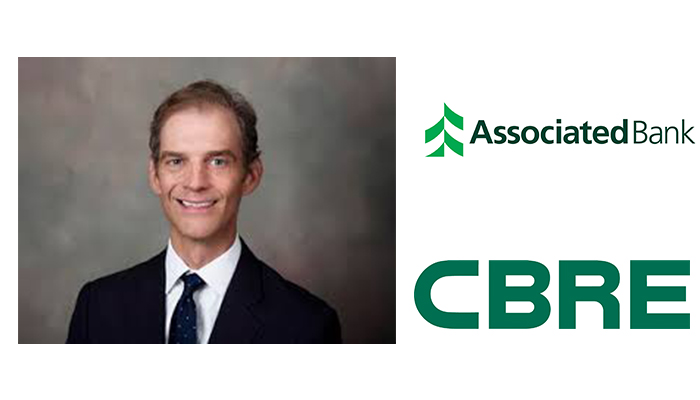
Part 2
Diversity in Real Estate: Success Stories for Company Leaders
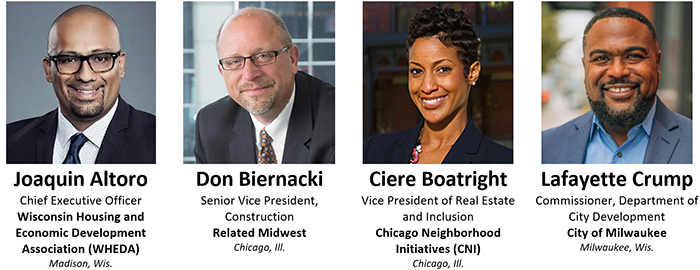
Part 2 of the 2020 Marquette Real Estate Strategies Conference Series took place on Thursday, October 8, 2020 and featured an exciting group of leaders in the real estate industry as they discussed diversity in real estate, success stories, and strategies for company leaders. The panel was moderated by Kevin Newell, President and CEO of Royal Capital Group. The full discussion can be found in the event video:
TAKEAWAYS FROM THE DISCUSSION
- Workforce development is key
- Partnering with agencies is really important for increasing the participation of diverse communities
- There are absolutely opportunities for a real return on investment in disinvested neighborhoods
- Innovation is important, thinking differently is important, and being focused on solving these problems is important
- We need to lift up more men and women of color in our city with our projects and work, but we need to ensure they get mentoring and are allowed to make mistakes and come back and learn and become better
- Leaders need to trust up-and-coming talented people of color and give them a chance to go make a difference. That trust could lead to incredible results
- Being authentic about the journey of engaging minority individuals and communities is really important – mistakes will be made but authenticity will help you learn and overcome the mistakes and dive even deeper into collaboration
- You need to engage! You need to engage to make even a small difference
- The intentionality is the thing – your success comes from engaging and being intentional about adding diversity to your business and in this industry
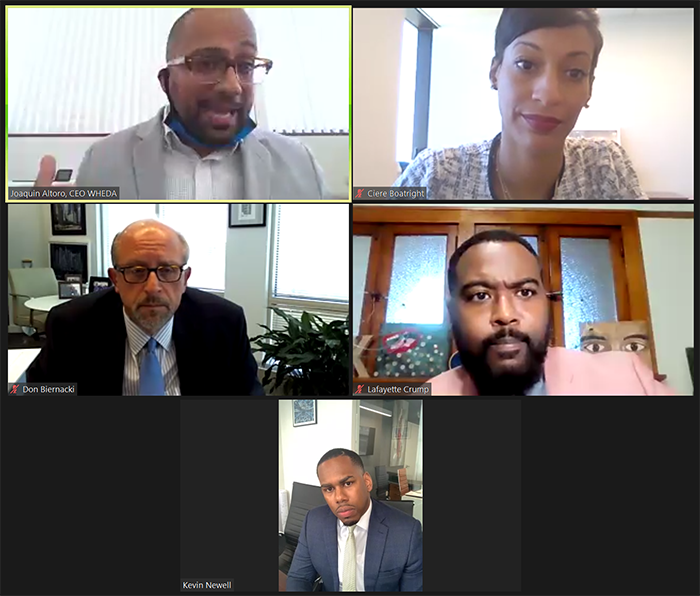
Thank you to CRE Advisory Board Chair Michelle Panovich for her opening comments, as well as fellow Advisory Board members Pat Biernacki and Kevin Newell for their help in organizing this amazing panel. A special thanks to our wonderful sponsors, including Platinum sponsors Associated Bank, CBRE, and Prologis, and our Gold sponsors Colliers International, Conor Commercial Real Estate, MichDon Properties, Mid-America Real Estate, North Shore Bank, Phoenix Investors, and Wintrust / Town Bank.
Part 3
2020 Retrospective Survey Results: Top 10 Trends from the Last Decade and the Next
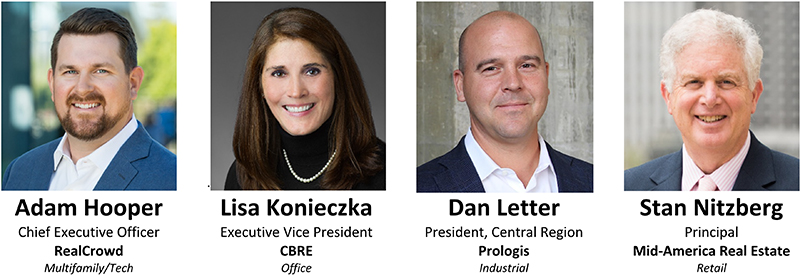
Part 3 of the 2020 Marquette Real Estate Strategies Conference Series took place on Thursday, November 5, 2020 and featured the release of the 2020 Retrospective Survey results, a publicly-available survey taken by more than 200 professionals (85% of which who had 10+ years of experience in the real estate industry). The survey was a thought-exercise that focused on identifying two things – first, the top 10 biggest trends to impact commercial real estate in the last ten years (2010-present), and second, the biggest and most likely trends to impact real estate in the decade ahead (present-2030). An all-star panel with specialists in office, industrial, retail, multifamily and tech broke down the findings and provided insight into the survey trends, both past and future, related to each asset class. The discussion was moderated by Kevin Smith, Instructor of Practice at Marquette University and retired Senior Managing Director and Head of the Americas for Prudential Real Estate. The full discussion can be found in the event video:
Takeaways from the discussion
- E-commerce is poised for even larger growth in the years ahead, driven by much more than just Amazon (although Amazon is certainly a big driver of this)
- Interest rates likely to stay low for the next several years, but ‘someone is going to have to pay eventually’ which will likely lead to rates rising in the decade ahead
- In office it’s all about where companies can get the most talent. Although the suburbs are experiencing strength in the office sector right now, cities are likely to continue to attract the most talent in the long-term
- A major question in the decade ahead is how retail and industrial collide, with e-commerce on the rise and big-box shopping malls beginning to be redeveloped into new uses. This wasn’t mentioned in the top 10 but is certainly going to be a big trend
- Technology is going to impact real estate exponentially more in the decade ahead, especially as we learn to better use the data we’re already collecting and advances in smart buildings and systems continue
Special thanks to several people who helped make this panel possible, including CRE Advisory Board Chair Michelle Panovich and board members Kevin Smith and Andy Sinclair.

 Part 1 of the 2020 Marquette University Real Estate Strategies Conference took place on Thursday, September 10, 2020 and featured a fireside chat with keynote speaker Bob Sulentic, President and CEO, CBRE (the largest real estate services company in the world, a Fortune 150 firm with more than 100,000 employees globally).
Part 1 of the 2020 Marquette University Real Estate Strategies Conference took place on Thursday, September 10, 2020 and featured a fireside chat with keynote speaker Bob Sulentic, President and CEO, CBRE (the largest real estate services company in the world, a Fortune 150 firm with more than 100,000 employees globally).





